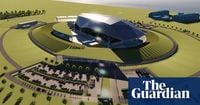On June 10, 2025, Rolls-Royce SMR was officially announced as the preferred bidder to build the United Kingdom's first small modular nuclear reactors (SMRs), marking a pivotal moment in the country's energy future. This decision, the culmination of a rigorous two-year competition, sets the stage for what government officials and industry leaders are calling a "golden age of nuclear" in Britain, as the nation seeks to accelerate its transition to clean, secure energy by the mid-2030s.
The UK government has committed a substantial £2.5 billion over the next four years to the SMR programme, aiming to kickstart one of Europe's first small-scale nuclear industries. SMRs, which are roughly the size of two football pitches, represent a revolutionary approach to nuclear power. Unlike traditional large plants that can take over a decade to build and often suffer from costly delays, these reactors are designed to be factory-built in modules and assembled on-site, significantly reducing construction time and costs.
Rolls-Royce SMR, majority-owned by the FTSE 100 engineering giant Rolls-Royce, which is renowned for powering Britain's nuclear submarines, will construct three SMR units. Each unit is expected to generate approximately 470 megawatts, with the trio collectively capable of producing up to 1.5 gigawatts of electricity. Once operational, these reactors could power around three million homes, providing stable, affordable, and emission-free energy for at least 60 years.
The government’s commitment to nuclear energy extends beyond SMRs. Alongside the £2.5 billion SMR investment, a £14.2 billion pledge was made to build Sizewell C, a large-scale nuclear power station in eastern England. Together with the new station at Hinkley Point C, these projects are anticipated to deliver more nuclear-generated electricity to the grid in the 2030s than the UK has seen in the last half-century.
Energy Secretary Ed Miliband hailed the announcement as a transformative moment, stating, "We are ending the no-nuclear status quo as part of our Plan for Change and are entering a golden age of nuclear with the biggest building programme in a generation." He emphasized the dual benefits of this initiative: bolstering energy security and creating thousands of new jobs, thereby stimulating regional economies.
This ambitious nuclear rollout is expected to support up to 3,000 skilled jobs at peak construction, with a strong focus on British industry. Chancellor Rachel Reeves reinforced this vision, highlighting the government's ambition to ensure that 70% of supply chain products are British-built, thereby supporting domestic manufacturing and putting more money in people’s pockets. Reeves remarked, "The UK is back where it belongs, taking the lead in the technologies of tomorrow with Rolls-Royce SMR as the preferred partner for this journey."
Great British Energy – Nuclear, the state-owned energy company tasked with overseeing the SMR programme, will soon sign contracts with Rolls-Royce SMR and establish a development company to manage the project. Plans are underway to allocate suitable sites later in 2025, with connections to the national grid targeted for the mid-2030s. While specific locations have not been publicly disclosed, industry insiders anticipate that the reactors will be sited at or near retired nuclear facilities such as Oldbury in Gloucestershire and Wylfa in North Wales, leveraging existing infrastructure to reduce costs and streamline deployment.
Simon Bowen, chairman of Great British Energy – Nuclear, described the selection of Rolls-Royce SMR as "a defining moment for the UK’s energy and industrial future," emphasizing that the project is about more than just energy production. "It’s about revitalising British industry, creating thousands of skilled jobs, and building a platform for long-term economic growth," he said. Gwen Parry-Jones, CEO of Great British Energy – Nuclear, echoed this sentiment, calling nuclear power "the cornerstone of the UK’s energy strategy" and expressing pride in leading this national mission.
The global market for SMRs is expected to reach nearly £500 billion by 2050, according to the International Energy Agency, and Britain’s early lead positions it as a frontrunner in this burgeoning sector. Dozens of countries, including the United States, Canada, Romania, and the Czech Republic, are exploring SMR technology, while major tech companies such as Amazon, Google, Microsoft, and Meta have shown increasing interest in nuclear energy to power their data centers. Meta recently signed a 20-year deal to source nuclear energy from a plant previously slated for decommissioning, underscoring the commercial potential of SMRs.
The Rolls-Royce SMR project itself has a rich history, with the company first submitting a design proposal in 2015. However, the journey has been fraught with delays, as approvals under both Conservative and Labour governments took longer than anticipated. Now, after demonstrating a significant lead—some 18 months ahead of competitors—in the regulatory assessment process, Rolls-Royce SMR is poised to deliver on its promise.
CEO Tufan Erginbilgic described the contract award as "a very significant milestone for our business and Rolls-Royce SMR. It is a vote of confidence in our unique nuclear capabilities, which will be recognised by governments around the world." He expressed optimism about the future, stating, "I believe the value of Rolls-Royce SMR will grow materially from here as we successfully execute and deliver on the potential of this venture."
Despite the enthusiasm, the SMR approach remains unproven globally, with no fully operational sites anywhere in the world as of yet. The technology relies on pressurized water reactors, a well-understood design, but the modular factory-built concept is novel and will face scrutiny from regulators and local communities alike. Environmental groups, such as the Green Party, have criticized nuclear power as slow and expensive, but proponents argue that SMRs offer a more flexible and cost-effective alternative to traditional nuclear plants.
Rolls-Royce SMR’s majority ownership by the British engineering firm is complemented by investors including Qatar’s sovereign wealth fund, BNF Resources from France, the US energy company Constellation, and the Czech utility CEZ, reflecting a broad international interest in the project. The company has already secured agreements to produce SMRs abroad, including in the Czech Republic, and is a finalist in a similar competition in Sweden, indicating the global reach of its ambitions.
The announcement has also had a positive impact on Rolls-Royce’s market valuation. On the day of the contract award, the company’s share price surged 2.4% to a record high of £9.12, making it the UK’s largest manufacturer by market value. This boost reflects investor confidence in both the company’s traditional aerospace and defense businesses and its growing nuclear energy division.
As Britain embarks on this bold nuclear chapter, the stakes are high. The successful deployment of SMRs could revolutionize the country's energy landscape, reduce dependence on imported gas, and help meet ambitious climate targets. With thousands of jobs on the line and billions of pounds invested, the eyes of the world will be watching closely as Rolls-Royce SMR and Great British Energy – Nuclear work to deliver the nation’s first fleet of small modular reactors.


